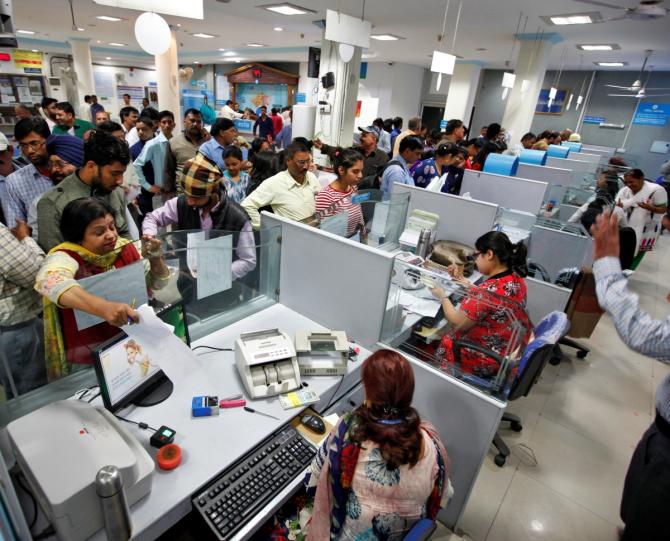It may sound bizarre, but incidents of public sector bankers dying by suicide could probably equal the number of such bankers quitting their jobs, reveals Tamal Bandyopadhyay.

It may sound like an apocryphal story. But it's not.
Early March, when India was celebrating Holi, the festival of colours, a senior banker attended the wedding of a close friend's daughter in Mumbai. It was a public holiday.
The gentleman stayed put through all the rituals over two days at a five-star hotel but was seen hiding whenever the camera clicked to shoot the goings-on.
Why was he doing that? Was he camera-shy? Not exactly.
He didn't want to leave any trace of his presence at the wedding.
The Delhi-based banker was not comfortable with the idea of any of his bosses getting to know that he was at the wedding in Mumbai over two days in March, the last month of the financial year.
This could have been interpreted as dereliction of duty. This is despite the fact that one of the two days was a public holiday.
In the past, the banker had seen a colleague being reprimanded for missing office for one day in March. He had fever.
This sums up the stress that most public sector bankers, across the hierarchy, go through.
There are many other pressure points. A few recent media reports tell us the story.
In early April, the Hindustan Times reported that the managing director of a Goregaon, north west Mumbai-based private company was booked for allegedly abetting the suicide of the manager of the State Bank of India's Hindu Colony branch, north central Mumbai.
The banker, Sandesh Malpani (44), had jumped off his ninth-floor flat. He had left behind a suicide note, alleging that he was forced to end his life because of the MD.
According to the FIR, the MD had drawn a loan of Rs 8.49 crore (Rs 84.9 million) from ICICI Bank Ltd.
The company had approached SBI's Hindu Colony branch for transferring the loan, which the branch did after preliminary assessment.
Under the terms of the transfer, the company was to submit the title deeds of two properties for which the loan was taken, but it did not.
Malpani's senior colleagues held him responsible for the lapse.
Under tremendous stress, the banker chose to end his life.
In his suicide note, he mentioned the names of three other bank officials who were involved in processing the loan.
Another report (in The Sentinel) in January was on Silchar (Assam) police arresting Yogendra Pandey, chief manager (audit) of SBI, for the mysterious death of a young branch manager, Kuldeep Dasgupta.
Pandey was arrested at the Silchar railway station from where he was about to catch the last train to Guwahati.
Going by the FIR, filed by the deceased's mother, Dasgupta had blown the whistle on the corrupt practices of some of his senior colleagues while sanctioning agricultural loans to local farmers.
He was mentally harassed, continuously, and even forced to buy gifts for Pandey, his mother alleged.
It may sound bizarre, but incidents of public sector bankers dying by suicide could probably equal the number of such bankers quitting their jobs.
They enjoy job security and also higher salary than their private sector peers at junior and middle levels, but the stress they go through is very different from what private bankers face.
The number of clerical employees and subordinates in banks has plunged in the past decade, between 2010 and 2021, while the number of officers has witnessed a sharp spike.
In 2005, clerks and subordinates combined made for at least 63 per cent of the employees in scheduled commercial banks. By 2010, this had dropped to 55 per cent and by 2021, 30 per cent.
That's the industry figure, but the decline is even sharper in the public sector, thanks to digitisation.
The number of branches has gone up by more than one-fourth in the past decade but employee strength has fallen.
Incidentally, in 2015, the finance ministry had asked the public sector lenders to consider promoting lower-rung employees on merit in view of the imminent retirement of many senior executives.
The ministry asked the banks to promote the competent clerks to scale I and II officers.
The pressure on such employees is too high as they struggle to cope with the new ecosystem and meet the high expectations of the organisation.
The HR heads of private banks have been facing a very different kind of challenge -- the highest-ever employee turnover (at least for some of these banks).
Till recently, the turnover was high for the front-end employees -- those interacting directly with the customers, including the relationship managers. But now employees across segments, including those involved in specialised jobs such as technology, compliance and risk management, have started leaving in hordes.
Apart from one bank poaching from another, bank employees are in high demand in IT companies, fintechs, techfins, fast-moving consumer goods outfits and even delivery service providers.
A section of them -- however small -- is also leaving to launch their own start-ups. An ambitious and restless lot, looking for different opportunities.
The issues in public sector banks are unique.
In most of the banks, the focus is on short-term monthly and quarterly targets for deposits and loans. That seems to be the main source of stress for the bankers.
There are other issues as well. As most banks are fast-tracking promotions, too many employees of different seniority levels are jostling for those positions, making the whole environment hostile.
Then, there is too much focus on cross-selling of financial products such as mutual funds and insurance policies.
For the time being, of course, the primary focus is on deposit mobilisation for most banks but, overall, the emphasis on cross-selling of other products for ramping up fee income is diluting pure-play banking and hurting the work ethics of many who firmly believe in conventional banking.
Add to these the perennial pressure of implementing several government schemes.
A bigger cultural issue is misbehaviour by senior bankers, who don't mind using abusive language to run their junior colleagues down.
Several video clippings have been doing the rounds on social media depicting such incidents.
The practice of blaming juniors for most lapses is creating a fear psychosis, leading a few to take extreme steps.
The poor HR culture seems to be prevalent in other public units in the financial sector such as Life Insurance Corporation of India.
In January, First India reported the suicide of Sujit Kumar Pandey, a senior manager at LIC.
The report, datelined Sasaram (Bihar), said Pandey had hanged himself.
The contents of his suicide note are not in the public domain, but his colleagues talk about work pressure as the trigger.
The psychological pressure is sometimes too much to bear even for senior employees.
I am aware of a senior general manager of one public sector bank whose blood pressure rises every time the managing director stops talking to him.
This happens for missing targets. At meetings, when he is ignored and the boss doesn't even look at him, he becomes restless and the time he spends in the office gets longer.
Will he quit his job? No. He will continue working in this high-stress environment and, hopefully, not reach the tipping point.
Tamal Bandyopadhyay is a consulting editor of Business Standard, is an author and senior adviser to Jana Small Finance Bank Ltd.
Feature Presentation: Rajesh Alva/Rediff.com











